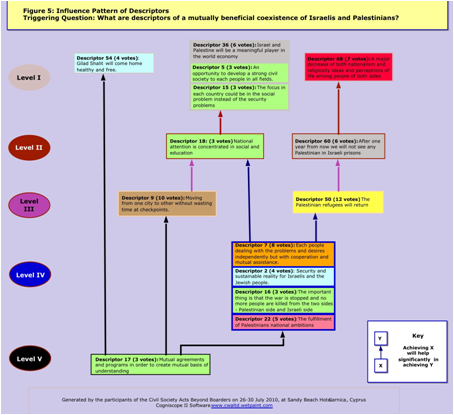SDDP Act Beyond Borders Vision Building in Larnaca in 2010: Difference between revisions
No edit summary |
No edit summary |
||
| Line 75: | Line 75: | ||
<br> | <br> | ||
'''Tree of Influence''' | |||
[[File:Tree_of_Influence-small2.png]] | [[File:Tree_of_Influence-small2.png]] | ||
<br> | <br> | ||
| Line 159: | Line 160: | ||
The workshop was facilitated by [[ | The workshop was facilitated by [[Yiannis Laouris]] ([[Cyprus Neuroscience and Technology Institute |CNTI]]), [[Aleco Christakis]] and [[]] ([[Cyprus Neuroscience and Technology Institute |CNTI]]), Antonis Loizou, Maria Kyprianou. | ||
Revision as of 07:48, 7 March 2013
|
SDD Co-Laboratory Overview
This report was prepared in the context of the project “Human Rights and Reconciliation – Civil Society Acts Beyond Borders’.
The project brought together stakeholders from Israel and the Palestinian Territories with the view of facilitating the peaceful conciliation and management of group interests and promoting solutions on divisive matters or controversial areas.
The Triggering Question (TQ) was:
“What are descriptors of a mutually beneficial co-existence of Israelis and Palestinians?”
In response to the TQ, the 21 participants of the interactive co-laboratory collected a total of 69 descriptors. In the next step, a smaller group of the participants clustered all ideas. The following ten clusters were formed:
Cluster 1: Freedom of Movement
Cluster 2: Sustainable Future for Israel
Cluster 3: Civil Society
Cluster 4: Equality and Self-determination
Cluster 5: Controversial Issues
Cluster 6: Allocation of Priorities
Cluster 7: Economic Cooperation
Cluster 9: Coexistence Tools
Cluster 10: No More War
Having classified all ideas according to the clusters, all participants voted for their most favourable descriptors. The votes were widely spread among most of the descriptors. The descriptors that received the most votes were:
Descriptor# 50 (12 votes): The Palestinian refugees will return.
Descriptor# 9 (10 votes): Moving from one city to other without wasting time at checkpoints.
Descriptor# 7 (8 votes): Each people dealing with the problems and desires independently but with cooperation and mutual assistance.
Descriptor# 68 (7 votes): A major decrease of both nationalism and religiosity ideas and perceptions of life among people of both sides.
Descriptor# 36 (6 votes): Israel and Palestine will be a major player in the world economy.
Descriptor# 60 (6 votes): After one year from now we will not see any Palestinian in Israeli prisons.
The voting results were used to select ideas for the subsequent structuring process which resulted in the creation of what is called ‘a tree of influences', shown below.
The highly complex ‘tree of influence’, also referred to as an ‘influence map’ consists of five different levels of influence. Descriptors at the bottom are considered to be the most influential. Making progress or achieving results in the bottom descriptors makes it a lot easier to address those that lie higher in the map.
Findings' Summary
In summary, almost all participants agreed that the following ideas are the most influential and agreed that further actions must take these ideas into account:
Descriptor# 17: Mutual agreements and programs in order to create mutual basis of understanding.
Descriptor# 22: The fulfilment of Palestinians’ national ambitions.
Descriptor# 16: The important thing is that the war is stopped and no more people are killed from the two sides - Palestinian side and Israeli side.
Descriptor# 2: Security and sustainable reality for Israelis and the Jewish people.
Descriptors#7 (cycle): Each people dealing with the problems and desires independently but with cooperation and
mutual assistance. Descriptor# 22: The fulfilment of Palestinians national ambitions, Descriptor# 16: The important thing is that the war is stopped and no more people are killed from the two sides - Palestinian side and Israeli side, Descriptor# 2: Security and sustainable reality for Israelis and the Jewish people, Descriptor# 7: Each people dealing with the problems and desires independently but with cooperation and mutual assistance.
Participants
The participants of the SDD co-laboratory are:
Abeer George Youssef Awwad - Palestinian
Aia Harel - Israeli
Anat Romberg - Israeli
Dar Nadler - Israeli
David Swissa - Israeli
Erez Naar - Israeli
Hana Azmi Al-Atrash - Palestinian
Husam Hussein m. almeghari - Palestinian
Itamar Tas - Israeli
Iyad m. a. faqih - Palestinian
Jehonatan Golany - Israeli
Karin Reingewertz- Israeli
Lior Reshef Deri- Israeli
Majd Jammal - Palestinian
Manal Isam Ali Ghaben - Palestinian
Qais Osama Abdel rahman Maghary - Palestinian
Roi Shindler - Israeli
Shadi ahmad Abdullah alassi - Palestinian
Simon Dabit - Palestinian
Yasmin Celine Confino - Israeli
Ziyad mohmd mohmd alaydi - Palestinian
The workshop was facilitated by Yiannis Laouris (CNTI), Aleco Christakis and [[]] (CNTI), Antonis Loizou, Maria Kyprianou.

